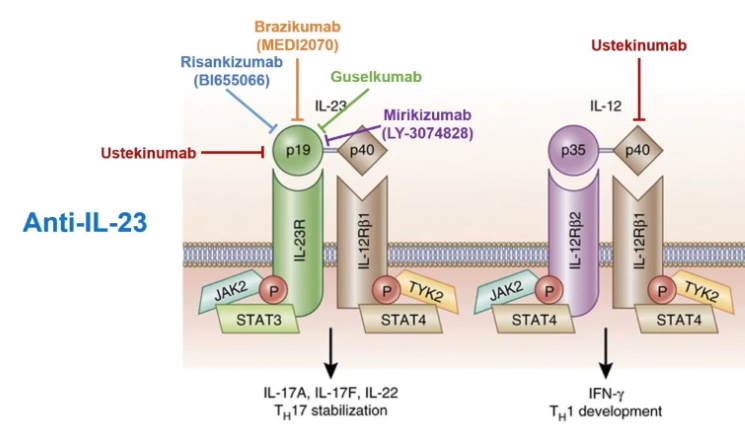
Prof Arthur Kaser
Antibodies that target the inflammatory cytokine IL-23 are the most promising new therapies for IBD likely to emerge in the next five years, according to a presentation at UEG Week 2020 Virtual meeting.
There are now four anti-IL23 therapies in phase 3 trials and they appear to be highly effective in both Crohns disease and ulcerative colitis, according to Professor Arthur Kaser, University Chair of Gastroenterology Cambridge University, UK.
Antibodies such as risankizumab, brazikumab, guselkumab and mirikizumab have shown efficacy in achieving remission in both induction therapy and in long term treatment, and also in patients who are refractory to anti-TNFs, he said in his presentation on future treatments for IBD
“My personal prediction is that IL-23 blockade will probably be as transformative in Crohns disease and UC as the anti-TNFs have been since the 1990s,” he said.
Professor Kaser said the IL-23 protein was only discovered in the year 2000, but within a few years it had been shown to be the key inflammatory cytokine in distal inflammation.
He explained that the anti-IL-23 antibodies acted by binding to the p19 subunit of IL-23 which combined with the p40 subunit to mediate numerous inflammatory processes, the most important being stabilisation of Th17 cells.
 The p40 subunit is also involved in the IL-12 protein which it is targeted by ustekinumab in IBD treatment, but Professor Kaser said trials in psoriasis, for which two anti-IL-23 agents are already licensed, showed that targeting IL-23 alone provided greater suppression of inflammation than IL-12/23 together.
The p40 subunit is also involved in the IL-12 protein which it is targeted by ustekinumab in IBD treatment, but Professor Kaser said trials in psoriasis, for which two anti-IL-23 agents are already licensed, showed that targeting IL-23 alone provided greater suppression of inflammation than IL-12/23 together.
“The two cytokines activate very different pathways and there is counter-regulation going on between them, so it may well be that we are losing a protective signal by blocking both cytokines,” he said.
The IL-23 antibodies also showed a good safety profile in psoriasis, and there is even the prospect of oral agents on the horizon, he added.
“These IL-23 antibodies have been a real triumph of basic research into inflammatory bowel disease,” he said.
But Professor Kaser also sounded a note of caution on predictions based on early research, highlighting the case of the integrin B7 blocker etrolizumab which recently showed mixed results in inducing and maintaining remission in large phase 3 trials in ulcerative colitis.
“These data have not yet been published in full and it will be important to see where etrolizumab will ultimately be placed,” he said.
His other prediction for the future of IBD treatment is that it will increasingly involve combination therapy such as with an an anti-IL-23 and anti-TNF therapy.
And in the longer term there are novel therapies such as anti-NKG2D antibodies, showing promise, he said.
“I think we are going to have several drugs that work reasonably well in patients who have failed anti-TNF treatment and I think this will come from being able to tackle the problem from very different mechanistic directions,” he said.